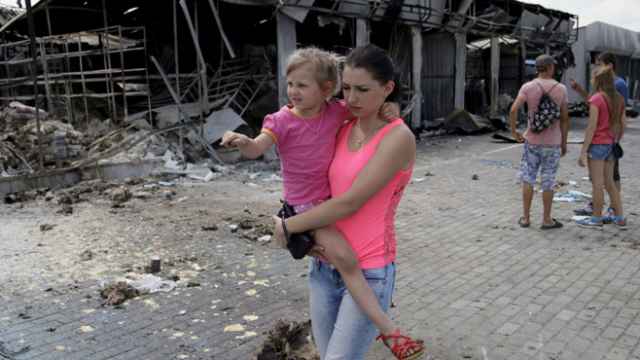Russia said Monday that it saw nothing new in the tough line taken by leaders of the Group of Seven (G7) on Moscow over sanctions and suggested there were differences among its member states.
British Prime Minister David Cameron and European Council President Donald Tusk said they hoped the G7, meeting in Germany, would present a united front on sanctions towards Russia over the Ukraine crisis.
"Yes, we paid attention to the latest declarations on sanctions. These are not new theses," Kremlin spokesman Dmitry Peskov told reporters.
"We also drew attention to the fact that among the participants of this meeting there are nuances in their approaches. Some talk about the need for dialogue with Russia and the impossibility of solving serious problems without this dialogue, so we continue watching closely."
European Union leaders agreed in March that its sanctions on Moscow over its role in Ukraine would stay until a cease-fire agreement reached in the Belarussian capital of Minsk on Feb. 12 is fully implemented, but a formal decision has yet to be taken.
Russia, which annexed the Crimea peninsula from Ukraine in March last year, denies providing pro-Russian separatists in east Ukraine with weapons and soldiers.
Peskov said the G7 should be aware which side must carry out its obligations under the Minsk agreement — implying Kiev.
Russian Foreign Minister Sergei Lavrov, speaking separately on Monday, urged Western powers to ensure that Kiev meets its obligations under the agreement, which include pulling back heavy weapons and allowing more autonomy in regions held by the separatists.
"We proceed from the fact that Germany and France, other colleagues in the EU and the United States … will work with the Ukrainian authorities, encouraging them honestly to fully implement the Minsk agreements," Lavrov told a news conference.
A Message from The Moscow Times:
Dear readers,
We are facing unprecedented challenges. Russia's Prosecutor General's Office has designated The Moscow Times as an "undesirable" organization, criminalizing our work and putting our staff at risk of prosecution. This follows our earlier unjust labeling as a "foreign agent."
These actions are direct attempts to silence independent journalism in Russia. The authorities claim our work "discredits the decisions of the Russian leadership." We see things differently: we strive to provide accurate, unbiased reporting on Russia.
We, the journalists of The Moscow Times, refuse to be silenced. But to continue our work, we need your help.
Your support, no matter how small, makes a world of difference. If you can, please support us monthly starting from just $2. It's quick to set up, and every contribution makes a significant impact.
By supporting The Moscow Times, you're defending open, independent journalism in the face of repression. Thank you for standing with us.
Remind me later.




